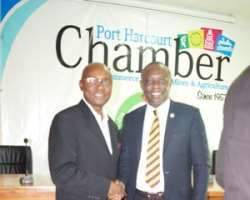PHCCIMA, Nigerian Shippers Council Interface To Revive Niger Delta Ports

As Port Harcourt Chamber of Commerce and the Nigerian Shippers Council interface on the way forward to restore maximum utilization of Rivers and other Niger Delta ports, PHCCIMA has expressed serious concern over the lingering abandonment and under utilization of ports in the south south region, calling for a genuine review of existing laws and policies in the shipping and maritime sector that will bring about equity and fairness, business opportunities, economic stimulation and added value to the sector. PHCCIMA had also described as outrageous crunchy exorbitant rates charged by Intel, operators of Onne port saying persistent inflated charges in toll gates fees and berth rates by Intel is stifling businesses in the area.
The President of PHCCIMA, Dr Emi Membere-Otaji with members of the PHCCIMA Shipping and Logistics, Export/ Import and General Merchandise trade groups gave this indication when PHCCIMA hosted a delegation of the National Headquarters and the South South zone of the Nigerian Shippers Council at the PHCCIMA Secretariat in Port Harcourt.
In an interactive session with members and officers of the shippers council Membere-Otaji expressed sadness that while the Lagos ports are heavily congested with ships lining up to get port calls to berth, Rivers ports are lying fallow due to little or no patronage. Apart from the Port at Onne in Rivers State which has been concessioned to Intel and whose charges are ridiculously stifling businesses in the area, the other seaports located at Port Harcourt, Calabar, Warri and Koko, seriously only exist by name. Membere-Otaji explained that the irony is that most importers who make use of the Lagos Ports have their businesses in the South South and South East geo-political zones.
Meanwhile, stakeholders at the interactive session stressed that most of the blame for under-utilization of the ports in south should be heaved on the Federal Government and the foreign shipping lines.
The government is said to have rolled out policies that have directly and indirectly stifled the operations of the ports in the south. They argue that prior to the concessioning of ports to private operators in 2006, the Federal Government gave up to 30 percent discount as incentives to shipping companies willing to use the ports in the east.
Most of these shipping companies accordingly jumped at the bait and the result was a boom in the operations at the eastern ports. But this incentive was withdrawn after the concession. To make things worse, the freight charged for using the eastern ports was hiked.
The PHCCIMA boss further lamented that 99% of his companies shipment comes in through the Lagos port instead of coming directly through the Rivers Ports. This according to him is as a result of the ridiculous rates charged at the ONNE Port by Intel.
Presenting some evidence of outrageous charges given to his company by intel, the President noted that Intel has done a good job in ONNE Port but observed that because they are agent to NPA they have their own percentage and this shoots up the tariff to a screaming high when compared to Lagos Port tariffs.
“For a small vessel to come into Onne Port and leave each entry and exit cost -$71,000 each for the toll gate, excluding other charges; but in Lagos vessels that are not loaded with consignment enters and exits the port without paying any fee.
How can businesses survive when a shipment of consignment from Port Harcourt to Lokoja in a locally built vessels attracts about a N100,000 in charges to rent per day but with the charges at Onne Port, it is difficult to do business successfully and this is not peculiar to Rivers Ports alone ; same is applicable to all the ports in the south including Warri, Calabar, Koko among others” he said.
The President said to achieve the new federal government diversification mantra, there must be a sincere review of the policies on ground as it concerns shipping and the maritime sector.. and concluded that apart from technical problems that can be dealt with later, the foremost issues that must be tackled is that of high rates and port services.
According to him that is why the partnership with the Nigerian Shippers Council to restore Rivers ports is timely, more so as the honourable minister of Transport is from the south south region he will be contacted to assist in our quest.
Vice chairman of the PHCCIMA Shipping and Logistics trade group, Chief Henry Njoku alleged that dirty politics was responsible for the under utilization of the ports within the Niger Delta Region, according to him measures and policies put in place were deliberate because the Government wanted to give undue advantage to the western ports thereby deliberately but slowly killing the eastern ports.
In his remark the Nigerian Shippers Council South- South zonal coordinator, Mr. Philip Eduwa noted that the problems facing the Eastern Ports are well known, he said there are lots of complains about the exorbitant rates charged which has forced some of the companies operating in Calabar port to leave.
According to him the Nigerian Shippers Council have been having series of meetings with intels to find a way forward; however recent findings indicatethat Intels are using the same rates used for Chevron and Shell to deal with other private business owners.
Eduwa assured that the Nigerian Shippers Council will partner with the Port Harcourt Chamber of Commerce and other stakeholders in the sector to ensure that the Rivers Ports function like that of Lagos. The Shippers Council has been intervening on various fronts and this partnership with PHCCIMA will be a driving force to chart a new cause for the shipping industry in the Niger delta region.
